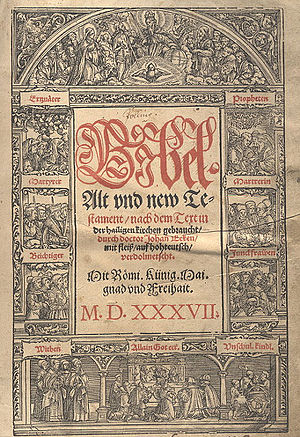| front page of Johannes Eck's catholic bible from 1537, the first translation of the full bible into Bavarian, three years after Martin Luther's translation into Middle German Español: página principal de la biblia católica de Johannes Eck del año 1537, la primera tradución completa de la en bavarés, tres años depues de la traducíon de Martin Luther en alemán central (Photo credit: Wikipedia) |
Both Catholic, Orthodox and Protestant traditions are in agreement as to which books belong in the New testament, so I won't get into the apocryphal writings that exist about and from New Testament times.
I'm neither Catholic or Orthodox (but in some ways, both--since I regard myself as a Christian), so I won't argue for or against any tradition's use of these books. I simply take the advice of Martin Luther [and others] who saw these books as useful for filling in some of the blanks in history between the Old and New Testaments and for holding some merit as devotional material. I would also remind some of my more conservative friends that books of the Apocrypha may also be found in some editions of the King James Version of the Bible.
Please understand that I am in no way suggesting that the Apocrypha are inspired scripture or should be taken as the Word of God in their entirety as some traditions do. There are legitimate concerns with that point of view. The only point of this blog is to occasionally post little jewels I glean as I read through the Apocrypha in pursuit of knowledge and a closer walk with God. God bless you as you seek to know Him better.


No comments:
Post a Comment